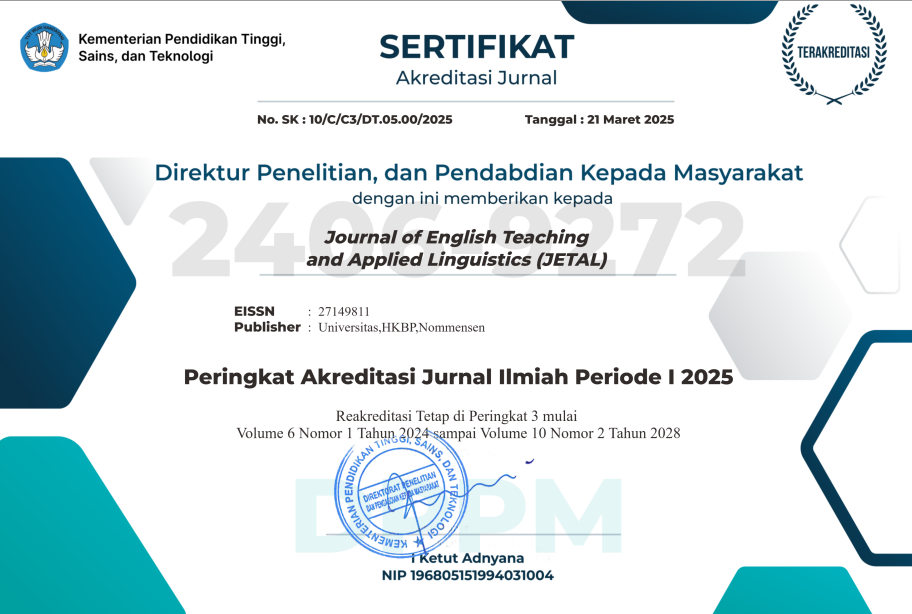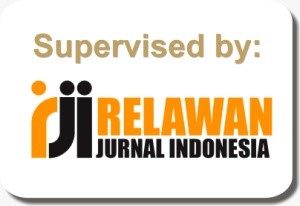AI-Driven Classroom Conversations: Revolutionizing Education 5.0 for Enhanced Student Engagement in Speaking Skills
Abstract
This study examines how modern education uses Artificial Intelligence (AI) technologies to improve student engagement and speaking skills. This study emphasizes the importance of tailored learning experiences and the potential of AI to transform language learning in the context of Education 5.0. The research seeks to fill the gap in education literature by showing how AI-driven classroom talks can improve student engagement and speaking skills. The study carefully evaluates AI-facilitated speaking activities in primary and high schools using a qualitative research design. The research shows how AI transforms student learning, improving engagement and speaking competency through case studies. The findings suggest using AI to supplement instructors rather than replace them. The study also explores Education 5.0's theoretical foundations, showing how AI can be used to personalize education, use big data to improve education, and increase education quality. Future studies should examine AI's effects on other language skills and its application to varied student demographics. This research advances the discussion on AI and education, enabling more nuanced studies of technology-enhanced learning.
References
Ahuja, K., & Bala, I. (2021). Role of Artificial Intelligence and IoT in Next Generation Education System. Intelligence of Things: AI-IoT Based Critical-Applications and Innovations, 189-208.HTML
Al Salman, S., Alkathiri, M., & Khaled Bawaneh, A. (2021). School off, learning on: identification of preference and challenges among school students towards distance learning during COVID19 outbreak. International Journal of Lifelong Education, 40(1), 53-71.researchgate.net
Alam, A. (2022). Employing adaptive learning and intelligent tutoring robots for virtual classrooms and smart campuses: reforming education in the age of artificial intelligence. In Advanced Computing and Intelligent Technologies: Proceedings of ICACIT 2022 (pp. 395-406). Indonesia: Springer Nature Indonesia.researchgate.net
Alamri, H. A., Watson, S., & Watson, W. (2021). Learning technology models that support personalization within blended learning environments in higher education. TechTrends.HTML
Arizmendi, C. J., Bernacki, M. L., Raković, M., Plumley, R. D., Urban, C. J., Panter, A. T., ... & Gates, K. M. (2023). Predicting student outcomes using digital logs of learning behaviors: Review, current standards, and suggestions for future work. Behavior research methods, 55(6), 3026-3054.springer.com
Bailey, D., Almusharraf, N., & Hatcher, R. (2021). Finding satisfaction: Intrinsic motivation for synchronous and asynchronous communication in the online language learning context. Education and Information Technologies, 26, 2563-2583.springer.com
Barrot, J. S. (). Effects of Facebook-based e-portfolio on ESL learners' writing performance. Language.HTML
Behnamnia, N., Kamsin, A., Ismail, M. A. B., & Hayati, A. (2020). The effective components of creativity in digital game-based learning among young children: A case study. Children and Youth Services Review, 116, 105227.HTML
Bhutoria, A. (2022). Personalized education and artificial intelligence in the United States, China, and India: A systematic review using a human-in-the-loop model. Computers and Education: Artificial Intelligence.sciencedirect.com
Borger, J. G., Ng, A. P., Anderton, H., Ashdown, G. W., Auld, M., Blewitt, M. E., ... & Naik, S. H. (2023). Artificial intelligence takes center stage: exploring the capabilities and implications of ChatGPT and other AI‐assisted technologies in scientific research and education. Immunology and Cell Biology, 101(10), 923-935.wiley.com
Butt, R., Siddiqui, H., Soomro, R. A., & Asad, M. M. (2020). Integration of Industrial Revolution 4.0 and IOTs in academia: a state-of-the-art review on the concept of Education 4.0 in Pakistan. Interactive Technology and Smart Education, 17(4), 337-354.HTML
Bylieva, D., Hong, J. C., Lobatyuk, V., & Nam, T. (2021). Self-regulation in e-learning environment. Education Sciences.mdpi.com
Cabrera-Solano, P. (2020). The use of digital portfolios to enhance English as a foreign language speaking skills in higher education. International Journal of Emerging Technologies in Learning (iJET), 15(24), 159-175.learntechlib.org
Camacho, A., Alves, R. A., & Boscolo, P. (2021). Writing motivation in school: A systematic review of empirical research in the early twenty-first century. Educational Psychology Review.HTML
Chen, H. (2022). On the training path of startups and innovation talents in vocational school under school-enterprise cooperation. significance.francis-press.com
Chen, T., Peng, L., Yin, X., Rong, J., Yang, J., & Cong, G. (2020). Analysis of user satisfaction with online education platforms in China during the COVID-19 pandemic. Healthcare.mdpi.com
Chen, Y., Jensen, S., Albert, L. J., Gupta, S., & Lee, T. (2023). Artificial intelligence (AI) student assistants in the classroom: Designing chatbots to support student success. Information Systems Frontiers, 25(1), 161-182.HTML
Collins, H. (2021). The science of artificial intelligence and its critics. Interdisciplinary Science Reviews.tandfonline.com
Davies, H. C., Eynon, R., & Salveson, C. (2021). The mobilisation of AI in education: A Bourdieusean field analysis. Sociology.sagepub.com
Divekar*, R. R., Drozdal*, J., Chabot*, S., Zhou, Y., Su, H., Chen, Y., ... & Braasch, J. (2022). Foreign language acquisition via artificial intelligence and extended reality: design and evaluation. Computer Assisted Language Learning, 35(9), 2332-2360.researchgate.net
Elsayary, A., Lawrence, M. E. D. A., Karaki, S., & Mohebi, L. (2024). THE EFFECTIVE USE OF VIRTUAL COMMUNICATION IN AN ONLINE PROFESSIONAL DEVELOPMENT PROGRAM: INVESTIGATING TEACHERS’ATTITUDES. Turkish Online Journal of Distance Education, 25(1), 78-94.dergipark.org.tr
Fang, C. & Lu, Q. (2021). Personalized recommendation model of high-quality education resources for college students based on data mining. Complexity.hindawi.com
Farquhar, J., Michels, N., & Robson, J. (2020). Triangulation in industrial qualitative case study research: Widening the scope. Industrial Marketing Management.bournemouth.ac.uk
Guan, C., Mou, J., & Jiang, Z. (2020). Artificial intelligence innovation in education: A twenty-year data-driven historical analysis. International Journal of Innovation Studies.sciencedirect.com
Halabi, O. (2020). Immersive virtual reality to enforce teaching in engineering education. Multimedia Tools and Applications.springer.com
He, Q., Borgonovi, F., & Paccagnella, M. (2021). Leveraging process data to assess adults' problem-solving skills: Using sequence mining to identify behavioral patterns across digital tasks. Computers & Education.nsf.gov
Heng, K. & Sol, K. (2021). Online learning during COVID-19: Key challenges and suggestions to enhance effectiveness. Cambodian Journal of Educational Research.academia.edu
Ho, Y. R., Chen, B. Y., Li, C. M., & Chai, E. G. Y. (2023). The distance between the humanities and medicine: Building a critical thinking mindset by interdisciplinary dialogue through mind mapping. Thinking Skills and Creativity.sciencedirect.com
Hodges, L. C. (2020). Student engagement in active learning classes. Active learning in college science: The case for evidence-based practice, 27-41.mdsoar.org
Hursen, C. (). The effect of problem-based learning method supported by web 2.0 tools on academic achievement and critical thinking skills in teacher education. Technology.HTML
Jamaludin, R., McKAY, E., & Ledger, S. (2020). Are we ready for Education 4.0 within ASEAN higher education institutions? Thriving for knowledge, industry and humanity in a dynamic higher education ecosystem?. Journal of Applied Research in Higher Education, 12(5), 1161-1173.HTML
Jeon, J. (2024). Exploring AI chatbot affordances in the EFL classroom: Young learners' experiences and perspectives. Computer Assisted Language Learning.HTML
Kabudi, T., Pappas, I., & Olsen, D. H. (2021). AI-enabled adaptive learning systems: A systematic mapping of the literature. Computers and Education: Artificial Intelligence, 2, 100017.sciencedirect.com
Kamińska, D., Zwoliński, G., Laska-Leśniewicz, A., Raposo, R., Vairinhos, M., Pereira, E., ... & Anbarjafari, G. (2023). Augmented reality: Current and new trends in education. Electronics, 12(16), 3531.mdpi.com
Keshav, M., Julien, L., & Miezel, J. (2022). The Role of Technology in Era 5.0 in the Development of Arabic Language in the World of Education. JILTECH: Journal International of Lingua & Technology, 1(2).kemdikbud.go.id
Kusuma, I., Mahayanti, N. W. S., Adnyani, L. D. S., & Budiarta, L. G. R. (2021). Incorporating E-Portfolio with Flipped Classrooms: An In-Depth Analysis of Students' Speaking Performance and Learning Engagement. JALT CALL Journal, 17(2), 93-111.ed.gov
Kwangmuang, P., Jarutkamolpong, S., Sangboonraung, W., & Daungtod, S. (2021). The development of learning innovation to enhance higher order thinking skills for students in Thailand junior high schools. Heliyon, 7(6).cell.com
Levanon, M. (2021). “The possibility to be creative is the reason I want to teach”: Pre-service teachers' perceptions of creative teaching and philosophical education. Social Sciences & Humanities Open.sciencedirect.com
Levitt, H. M. (2021). Qualitative generalization, not to the population but to the phenomenon: Reconceptualizing variation in qualitative research.. Qualitative Psychology.HTML
Li, L., Zhang, R., & Piper, A. M. (2023). Predictors of student engagement and perceived learning in emergency online education amidst COVID-19: A community of inquiry perspective. Computers in Human Behavior Reports.sciencedirect.com
Liu, M., Shi, Y., Pan, Z., Li, C., Pan, X., & Lopez, F. (2021). Examining middle school teachers’ implementation of a technology-enriched problem-based learning program: Motivational factors, challenges, and strategies. Journal of Research on Technology in Education, 53(3), 279-295.HTML
Luna, A., Chong, M., & Jurburg, D. (2022). Teaching integration, trust, communication, and collaboration competencies using challenge-Based learning for business and engineering programs. IEEE Revista Iberoamericana de Tecnologias del Aprendizaje, 17(1), 89-98.researchgate.net
Maddikunta, P. K. R., Pham, Q. V., Prabadevi, B., Deepa, N., Dev, K., Gadekallu, T. R., ... & Liyanage, M. (2022). Industry 5.0: A survey on enabling technologies and potential applications. Journal of Industrial Information Integration, 26, 100257.uj.ac.za
Martin, F. & Borup, J. (2022). Online learner engagement: Conceptual definitions, research themes, and supportive practices. Educational Psychologist.HTML
Mathrani, A., Susnjak, T., Ramaswami, G., & Barczak, A. (2021). Perspectives on the challenges of generalizability, transparency and ethics in predictive learning analytics. Computers and Education Open, 2, 100060.sciencedirect.com
Middleton, K. V. (2020). The longer‐term impact of COVID‐19 on K–12 student learning and assessment. educational measurement: issues and practice.nih.gov
Miranda, J., Navarrete, C., Noguez, J., Molina-Espinosa, J. M., Ramírez-Montoya, M. S., Navarro-Tuch, S. A., ... & Molina, A. (2021). The core components of education 4.0 in higher education: Three case studies in engineering education. Computers & Electrical Engineering, 93, 107278.sciencedirect.com
Mourtzis, D., Angelopoulos, J., & Panopoulos, N. (2022). A Literature Review of the Challenges and Opportunities of the Transition from Industry 4.0 to Society 5.0. Energies.mdpi.com
Muzari, T., Shava, G. N., & Shonhiwa, S. (2022). Qualitative research paradigm, a key research design for educational researchers, processes and procedures: A theoretical overview. Indiana Journal of Humanities and Social Sciences, 3(1), 14-20.indianapublications.com
Oberer, B. & Erkollar, A. (2023). Education 5.0: Design Thinking Goes ICT. The Learning Ideas Conference.HTML
Ong, Q. K. L. & Annamalai, N. (2023). Technological pedagogical content knowledge for twenty-first century learning skills: the game changer for teachers of industrial revolution 5.0. Education and Information Technologies.HTML
Ouyang, F. & Jiao, P. (2021). Artificial intelligence in education: The three paradigms. Computers and Education: Artificial Intelligence.sciencedirect.com
Pelau, C., Dabija, D. C., & Ene, I. (2021). … AI device human-like? The role of interaction quality, empathy and perceived psychological anthropomorphic characteristics in the acceptance of artificial intelligence …. Computers in Human Behavior.HTML
Pizoń, J. & Gola, A. (2022). The meaning and directions of development of personalized production in the era of industry 4.0 and industry 5.0. International Conference Innovation in Engineering.researchgate.net
Reeve, J., Cheon, S. H., & Jang, H. (2020). How and why students make academic progress: Reconceptualizing the student engagement construct to increase its explanatory power. Contemporary Educational Psychology.HTML
Rustamov, I. T., & Mamaziyayev, Z. X. (2022). Development of speaking comprehension in teaching foreign language for professional purposes. Asian Journal of Research in Social Sciences and Humanities, 12(2), 227-233.scienceweb.uz
Salmon, A. K. & Barrera, M. X. (2021). Intentional questioning to promote thinking and learning. Thinking Skills and Creativity.sciencedirect.com
Sanusi, I. T., Oyelere, S. S., & Omidiora, J. O. (2022). Exploring teachers' preconceptions of teaching machine learning in high school: A preliminary insight from Africa. Computers and Education Open.sciencedirect.com
Sharma, S. (2023). Adoption of 5.0 Online and Collaborative Education Among the Youth of Indonesia. In Transformation for Sustainable Business and Management Practices: Exploring the Spectrum of Industry 5.0 (pp. 141-154). Emerald Publishing Limited.HTML
Shim, T. E. & Lee, S. Y. (2020). College students' experience of emergency remote teaching due to COVID-19. Children and youth services review.nih.gov
Singh, S. V., & Hiran, K. K. (2022). The Impact of AI on Teaching and Learning in Higher Education Technology. Journal of Higher Education Theory & Practice, 12(13).articlearchives.co
Spöttl, G. & Windelband, L. (2021). The 4th industrial revolution – its impact on vocational skills. Journal of Education and Work.tandfonline.com
Sułkowski, Ł., Kolasińska-Morawska, K., Seliga, R., & Morawski, P. (2021). Smart learning technologization in the economy 5.0—the polish perspective. Applied Sciences, 11(11), 5261.mdpi.com
Summers, R. J., Higson, H. E., & Moores, E. (2021). Measures of engagement in the first three weeks of higher education predict subsequent activity and attainment in first year undergraduate students: a UK case study. Assessment & Evaluation in Higher Education, 46(5), 821-836.aston.ac.uk
Tai, T. Y. (2022). Effects of intelligent personal assistants on EFL learners' oral proficiency outside the classroom. Computer Assisted Language Learning.HTML
Tang, M., Zhou, H., Yan, Q., Li, R., & Lu, H. (2022). Virtual medical learning: a comprehensive study on the role of new technologies. Kybernetes.HTML
Tang, T., Abuhmaid, A. M., Olaimat, M., Oudat, D. M., Aldhaeebi, M., & Bamanger, E. (2023). Efficiency of flipped classroom with online-based teaching under COVID-19. Interactive Learning Environments, 31(2), 1077-1088.academia.edu
Tang, T., Vezzani, V., & Eriksson, V. (2020). Developing critical thinking, collective creativity skills and problem solving through playful design jams. Thinking Skills and Creativity.whiterose.ac.uk
Tavares, M. C., Azevedo, G., Marques, R. P., & Bastos, M. A. (2023). Challenges of education in the accounting profession in the Era 5.0: A systematic review. Cogent Business & Management, 10(2), 2220198.tandfonline.com
Teo, T., Unwin, S., Scherer, R., & Gardiner, V. (2021). Initial teacher training for twenty-first century skills in the Fourth Industrial Revolution (IR 4.0): A scoping review. Computers & Education.HTML
Trakadas, P., Simoens, P., Gkonis, P., Sarakis, L., Angelopoulos, A., Ramallo-González, A. P., ... & Karkazis, P. (2020). An artificial intelligence-based collaboration approach in industrial iot manufacturing: Key concepts, architectural extensions and potential applications. Sensors, 20(19), 5480.mdpi.com
Valverde-Berrocoso, J., Garrido-Arroyo, M. D. C., Burgos-Videla, C., & Morales-Cevallos, M. B. (2020). Trends in educational research about e-learning: A systematic literature review (2009–2018). Sustainability, 12(12), 5153.mdpi.com
van Dijk, E. E., van Tartwijk, J., van der Schaaf, M. F., & Kluijtmans, M. (2020). What makes an expert university teacher? A systematic review and synthesis of frameworks for teacher expertise in higher education. Educational Research Review, 31, 100365.sciencedirect.com
Wahyuningsih, S. & Afandi, M. (2020). Investigating English Speaking Problems: Implications for Speaking Curriculum Development in Indonesia.. European Journal of Educational Research.ed.gov
Wamba-Taguimdje, S. L., Fosso Wamba, S., Kala Kamdjoug, J. R., & Tchatchouang Wanko, C. E. (2020). Influence of artificial intelligence (AI) on firm performance: the business value of AI-based transformation projects. Business Process Management Journal, 26(7), 1893-1924.researchgate.net
Wang, K., Zhao, Y., Gangadhari, R. K., & Li, Z. (2021). Analyzing the adoption challenges of the Internet of things (Iot) and artificial intelligence (ai) for smart cities in china. Sustainability.mdpi.com
Wang, X., Pang, H., Wallace, M. P., Wang, Q., & Chen, W. (2022). Learners’ perceived AI presences in AI-supported language learning: a study of AI as a humanized agent from community of inquiry. Computer Assisted Language Learning, 1-27.um.edu.mo
Wong, Z. Y. & Liem, G. A. D. (2022). Student engagement: Current state of the construct, conceptual refinement, and future research directions. Educational Psychology Review.researchgate.net
Yan, L., Sha, L., Zhao, L., Li, Y., Martinez‐Maldonado, R., Chen, G., ... & Gašević, D. (2024). Practical and ethical challenges of large language models in education: A systematic scoping review. British Journal of Educational Technology, 55(1), 90-112.wiley.com
Yan, S. & Yang, Y. (2021). Education informatization 2.0 in China: Motivation, framework, and vision. ECNU Review of Education.sagepub.com
Yang, Y., Zhuang, Y., & Pan, Y. (2021). Multiple knowledge representation for big data artificial intelligence: framework, applications, and case studies. Frontiers of Information Technology & Electronic Engineering, 22(12), 1551-1558.HTML
Yin, W. (2022). Personalized Hybrid Education Framework Based on Neuroevolution Methodologies. Computational Intelligence and Neuroscience.hindawi.com
Yulianti, T., & Sulistiyawati, A. (2020, March). The Blended Learning for Student’s Character Building. In International Conference on Progressive Education (ICOPE 2019) (pp. 56-60). Atlantis Press.atlantis-press.com
Zhai, X., Chu, X., Chai, C. S., Jong, M. S. Y., Istenic, A., Spector, M., ... & Li, Y. (2021). A Review of Artificial Intelligence (AI) in Education from 2010 to 2020. Complexity, 2021, 1-18.hindawi.com
Zhang, K. & Aslan, A. B. (2021). AI technologies for education: Recent research & future directions. Computers and Education: Artificial Intelligence.sciencedirect.com
Zhang, R. & Zou, D. (2022). Types, purposes, and effectiveness of state-of-the-art technologies for second and foreign language learning. Computer Assisted Language Learning.HTML
Zhou, C. (2023). Integration of modern technologies in higher education on the example of artificial intelligence use. Education and Information Technologies.HTML
Zou, D., Wang, M., Xie, H., Cheng, G., Wang, F. L., & Lee, L. K. (2021). A comparative study on linguistic theories for modeling EFL learners: facilitating personalized vocabulary learning via task recommendations. Interactive Learning Environments, 29(2), 270-282.HTML
Zvoch, K., Holveck, S., & Porter, L. (2021). Teaching for conceptual change in a density unit provided to seventh graders: a comparison of teacher-and student-centered approaches. Research in Science Education.HTML

This work is licensed under a Creative Commons Attribution-ShareAlike 4.0 International License.
Authors retain copyright and grant the journal right of first publication with the work simultaneously licensed under a Creative Commons Attribution-ShareAlike 4.0 International License (CC BY-SA 4.0) that allows others to share the work with an acknowledgment of the work's authorship and initial publication in this journal.
Authors are able to enter into separate, additional contractual arrangements for the non-exclusive distribution of the journal's published version of the work (e.g., post it to an institutional repository or publish it in a book), with an acknowledgment of its initial publication in this journal.
Authors are permitted and encouraged to post their work online (e.g., in institutional repositories or on their website) prior to and during the submission process, as it can lead to productive exchanges, as well as earlier and greater citation of published work (See The Effect of Open Access).






